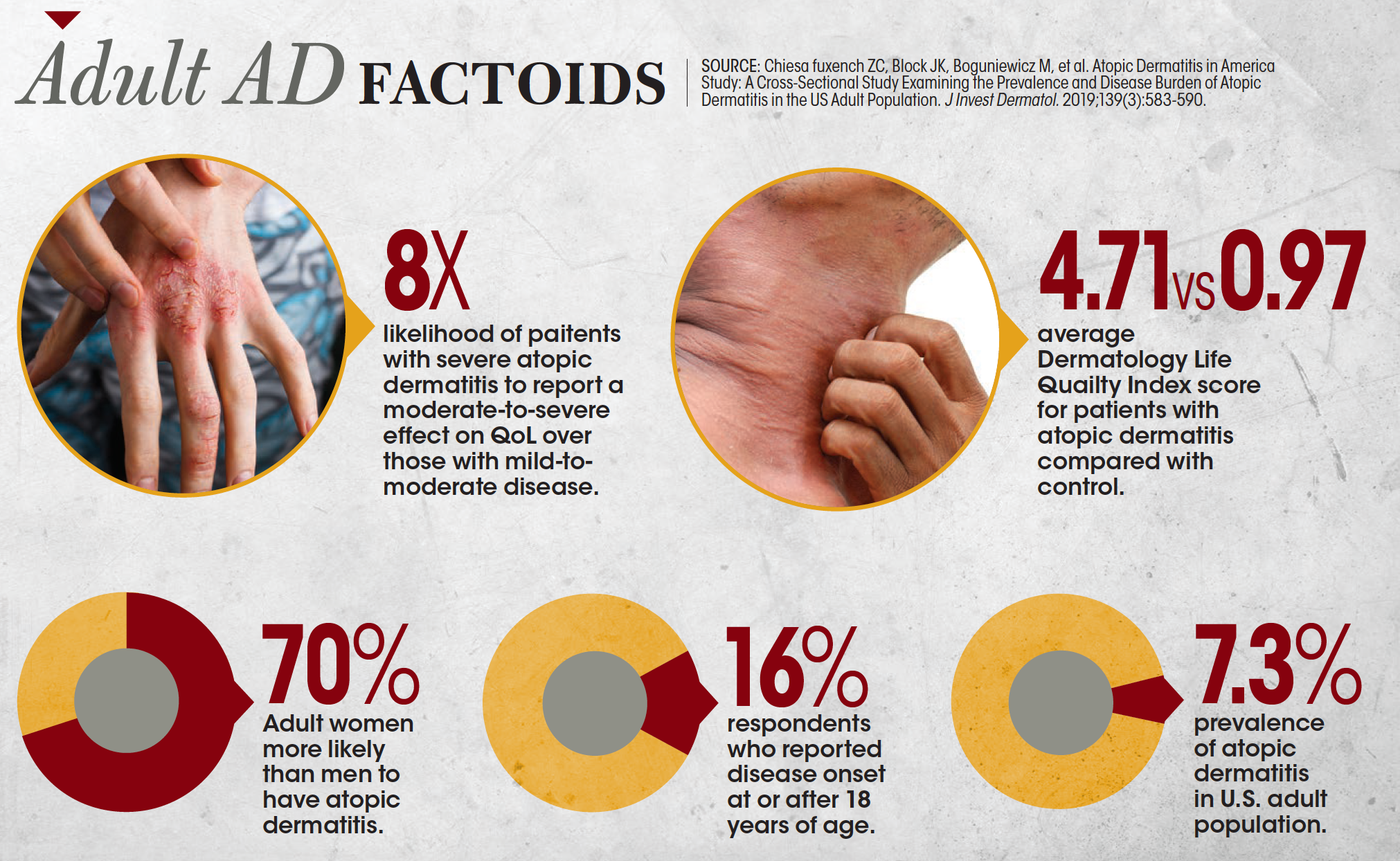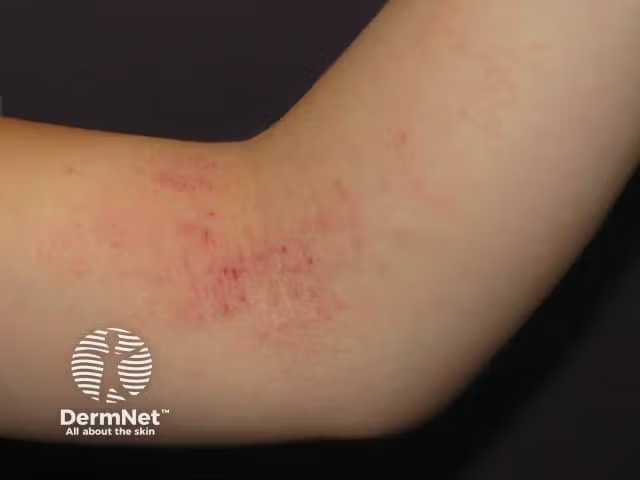- Case-Based Roundtable
- General Dermatology
- Eczema
- Chronic Hand Eczema
- Alopecia
- Aesthetics
- Vitiligo
- COVID-19
- Actinic Keratosis
- Precision Medicine and Biologics
- Rare Disease
- Wound Care
- Rosacea
- Psoriasis
- Psoriatic Arthritis
- Atopic Dermatitis
- Melasma
- NP and PA
- Skin Cancer
- Hidradenitis Suppurativa
- Drug Watch
- Pigmentary Disorders
- Acne
- Pediatric Dermatology
- Practice Management
- Prurigo Nodularis
- Buy-and-Bill
Article
Adult atopic dermatitis big impact
Author(s):
Adult AD burden higher than many realize.

Two recent studies-one looking at atopic dermatitis prevalence and disease severity in U.S. adults and another at the burden of adult atopic dermatitis throughout Europe-suggest adult atopic dermatitis is much more common, severe and burdensome to people’s quality of life, mental health and productivity than many might realize.
Adult atopic dermatitis in America
Atopic dermatitis prevalence in the U.S. adult population is 7.3%, according to a study published March 2019 in the Journal of Investigative Dermatology.1
The population study of 1,278 surveyed adults confirms prevalence estimates from previous studies of the CDC’s National Health Interview Study, according to study author Jonathan Silverberg, M.D., Ph.D., M.P.H., director of the Northwestern Medicine Eczema Center and Contact Dermatitis Clinic, Northwestern Memorial Hospital, Chicago.
The new data might surprise dermatologists and other providers who thought that moderate-to-severe atopic dermatitis was primarily a pediatric disease.
More than 16% of those surveyed who had atopic dermatitis reported disease onset at or after 18 years of age. And adult women were 70% more likely than men to have atopic dermatitis.
“The study demonstrates that the proportion of adults with moderate-to-severe atopic dermatitis is higher compared to children,” Dr. Silverberg says.
The prevalence and severity of atopic dermatitis trumps that of many other dermatologic diseases in adults, according to study author Joel M. Gelfand, M.D., M.S.C.E., professor of dermatology at Penn Medicine.
“If you compare atopic dermatitis in adults to psoriasis, the prevalence of psoriasis in the adult population is about 2 to 4% and roughly 20% have moderate-to-severe disease,” Dr. Gelfand says.
While many adults in this country with atopic dermatitis have mild disease-about 60% in the study published this year-28.9% had moderate and 11% had severe atopic dermatitis.
The authors estimate based on their findings that 16.5 million U.S. adults have atopic dermatitis and 6.6 million meet criteria for moderate-to-severe disease.
Not surprisingly, the more severe the atopic dermatitis, the bigger the negative impact on quality of life, according to the authors.
“There is a major burden of atopic dermatitis on quality of life and mental health in adults,” Dr. Silverberg says.
People surveyed with atopic dermatitis reported an average Dermatology Life Quality Index score of 4.71 compared to 0.97 among controls. While even the 4.71 score indicates what the authors call a small effect on quality of life, when the authors stratified by disease severity, they found people with severe atopic dermatitis were 8 times more likely than those with mild-to-moderate disease to report a moderate-to-severe effect on life quality.
Those with atopic dermatitis were also more likely than controls to report anxiety or depression.
The data highlights for dermatologists the burden atopic dermatitis has on patients’ well-being, according to Dr. Gelfand.
“It shows how psychological suffering co-mingles with atopic dermatitis. Anxiety and depression may aggravate inflammatory diseases like eczema. Similarly, having eczema may aggravate and induce anxiety and depression in patients. It’s an arrow we think goes both ways,” Dr. Gelfand says.
The results emphasize the need for tighter disease control, Dr. Silverberg says.
“Improved understanding of the burden of atopic dermatitis helps to identify unmet needs in the disease management and opportunities for improved therapeutic intervention. Recognition that atopic dermatitis is associated with a high disease-burden is also important for future resource allocation,” Dr. Silverberg says.
What European data offers
Adult atopic dermatitis patients throughout Europe report the disease significantly impacts their health, health-related quality-of-life, productivity, activities and healthcare utilization, according to a newly published study in the Journal of the American Academy of Dermatology.2
Researchers referred to data from the 2016 National Health and Wellness Survey conducted in France, Germany, Italy, Spain and the U.K.
They analyzed not only atopic dermatitis patients and non-atopic-dermatitis adult controls but also a subset of inadequately-controlled atopic dermatitis patients.
The authors found:
- Nearly 13% of controls self-reported depression, versus 25.8% of those with atopic dermatitis and 36.2% of people with inadequately-controlled atopic dermatitis.
- More than 14% of controls reported anxiety compared to nearly 32% of those with atopic dermatitis and nearly 52% of those with inadequately-controlled disease.
- Health-related quality of life scores were lower in patients with atopic dermatitis than in controls, with the lowest scores among those with inadequately-controlled atopic dermatitis.
- More than half, about 57%, of inadequately controlled patients reported work impairment, compared to 23.7% of controls. And nearly 52% of inadequately-controlled atopic dermatitis patients reported activity impairment compared to 26.5% of controls.
- More than 21% of atopic dermatitis patients and 37.9% of those with inadequately-controlled disease said they went to the emergency department once or more often in the last six months, compared to 16.5% of controls.
Patients with atopic dermatitis were also more likely than those without the disease to visit clinicians.
“These findings demonstrate the burden of eczema on how people function globally,” says Dr. Gelfand, who also was senior author on this paper. “We know [eczema] waxes and wanes. Sometimes people are more in remission and sometimes they’re more in flair states. Certainly, when eczema is not controlled, the burden goes up so it’s a rollercoaster ride for patients.”
An important take-home message from both papers, according to Dr. Gelfand, is the need for dermatologists to find better ways to do outreach to patients and let them know about today’s effective treatment options.
Disclosures:
Dr. Silverberg served as a consultant and/or advisory board member for Abbvie, Asana, Dermavant, Dermira, Eli Lilly, Galderma, GlaxoSmithKline, Glenmark, Kiniksa, Leo, Menlo, Pfizer, Regeneron-Sanofi, Realm. He has received honoraria and been a speaker for Regeneron-Sanofi. He also has received research grants from GlaxoSmithKline and Galderma.
Dr. Gelfand served as a consultant for Bristol-Myers Squibb, Boehringer Ingelheim, GlaxoSmithKline, Janssen Biologics, Menlo Therapeutics, Novartis, Regeneron, Dr Reddy’s labs, Union Chimique Belge (UCB) (Data Safety Monitoring Board (DSMB)), Sanofi, and Pfizer, receiving honoraria; receives research grants (to the Trustees of the University of Pennsylvania) from AbbVie, Janssen, Novartis, Sanofi, Celgene, Ortho Dermatologics, and Pfizer; and received payment for continuing medical education work related to psoriasis that was supported indirectly by Lilly and Ortho Dermatologics. He is also a co-patent holder of resiquimod for treatment of cutaneous T-cell lymphoma and is a deputy editor for the Journal of Investigative Dermatology, receiving honoraria from the Society for Investigative Dermatology.
The European study was funded by Sanofi and Regeneron and two of the authors of that study are Sanofi employees.
References:
- Chiesa fuxench ZC, Block JK, Boguniewicz M, et al. Atopic Dermatitis in America Study: A Cross-Sectional Study Examining the Prevalence and Disease Burden of Atopic Dermatitis in the US Adult Population. J Invest Dermatol. 2019;139(3):583-590.
- Eckert L, Gupta S, Gadkari A, Mahajan P, Gelfand JM. Burden of illness in adults with atopic dermatitis: Analysis of National Health and Wellness Survey data from France, Germany, Italy, Spain, and the United Kingdom. J Am Acad Dermatol. 2019;81(1):187-195.






